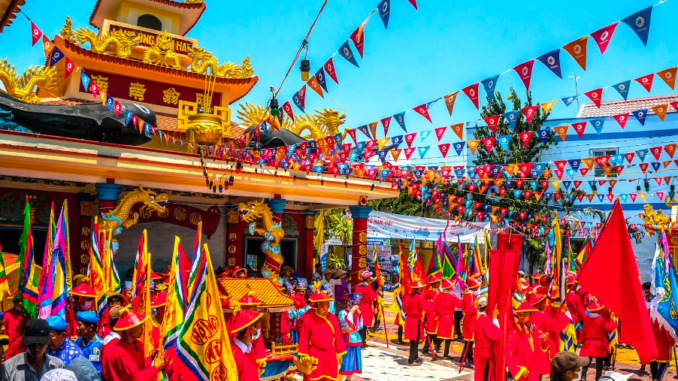
The whale worship festival typically reflects the original folk culture of fishing communities along the southern central and southern coasts of Vietnam, from Da Nang to Ba Ria – Vung Tau provinces.
The festival mirrors the belief and spiritual life of coastal villages which all have a temple devoted to Ca Ong (Mr Whale), which is believed to be the guardian angel of seafarers.
The Origin of Whale Worship Festival
The whale cult was rooted from Cham people’s belief that Ca Ong embodies Cha Aih Va or Po Riyah, the powerful God of Sea, who can calm the waves and protect seafarers in distress.
But Buddhist fishermen believe Ca Ong was the incarnation of Bodhisattva of Mercy, a salvor of seagoers. As Buddhist legend has it, one day the Goddess of Mercy strolled in the clouds above the East Sea and was so heartbroken to see fishing boats sunk by storms. She tore off her robe into pieces which turned into thousands of whales. The giant powerful whales saved the fishermen and led their boats to shelter. Reaching ashore, the rescued fishermen prostrated themselves on the sand toward the sea to express their gratitude and since then built temples along the coast to worship the creature.
The reverence of whale as a deity of fishing communities was upheld during the reign of the Nguyen dynasty. Historical tale told that Lord Nguyen Anh (1761-1820), who later became King Gia Long, was hit by a hurricane on Soai Rap river when he was on the way to escape from Tay Son soldiers. His boats and soldiers were on the brink of sinking amid a fierce gale when a giant whale appeared, leading the fleet safely to Vam Lang in Tien Giang province. When coming to the throne, Nguyen Anh bestowed on the whale the title of Nam Hai Dai Tuong Quan (His Excellency the Marshal of the Southern Sea) to commemorate his merit, and ordered coastal villages to build temples dedicated to Nam Hai Dai Tuong Quan.
The whale cult is not only to show the veneration of fishermen’s guardian angel but is believed to be linked to the prosperity of a fishing village. When a dead whale is washed ashore, fishermen will hold a solemn funeral for him.
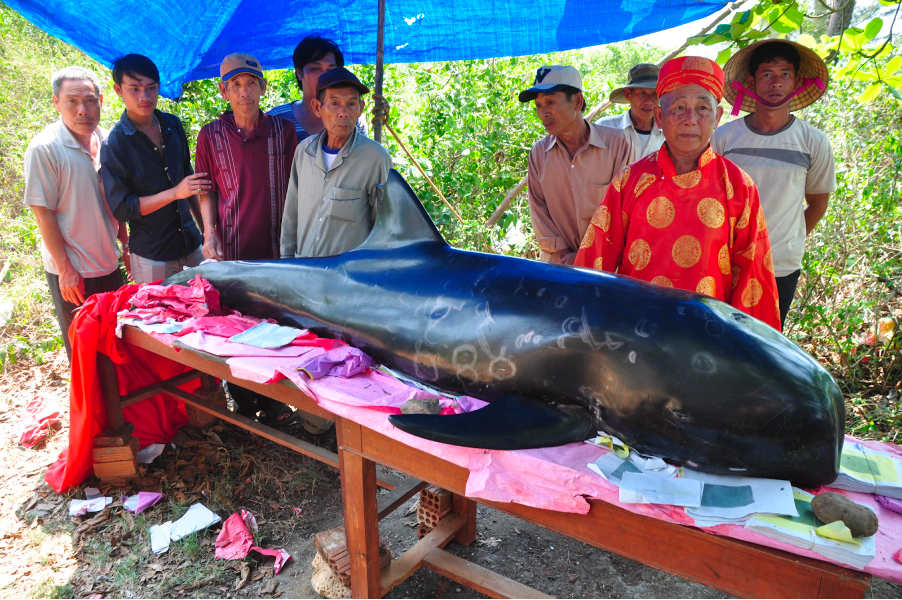
The whale worship festival is held as a way to celebrate the death anniversary of Ca Ong. It is also a chance for fishermen to show their gratitude toward Ca Ong and other gods and seek their support for safe voyages and bumper hauls. The date of the festival varies from one locality to another. In Phu Quoc – Kien Giang, it is held on August 15 and 16 , and in Ca Mau is on February 14, 15, 16 of the lunar calendar.
Activities of Festival
The festival consists of rituals and festive activities. The rituals include three ceremonies, namely Ca Ong escort, god worship and village founder worship.
The offerings of the festival must not contain seafood and usually include a pig, two trays of sticky rice, wine, tea, fruits, flowers and votive papers.
The escort ceremony is conducted in the Ca Ong temple, aiming to escort the spirit of Ca Ong and those dying at sea to the temple to enjoy the offerings. When the ritual conductor is praying in front of the altar to invite the spirit of Ca Ong to return home, a singing band sings and dances outside. The band consists of 24 singers in green robes with red belts, who sing the Bả Trạo (boat rowing) folk song and move gracefully in a rowing dance which praises unity and courage of fishermen in sailing on big waves to bring home rich catches. The band’s leading singer carries a white oar with a red handle on which is drawn a yellow dragon while others hold smaller black and white oars. The performance is backed by a music band composed of drum, clarion, bamboo flute and two-cord fiddle players.
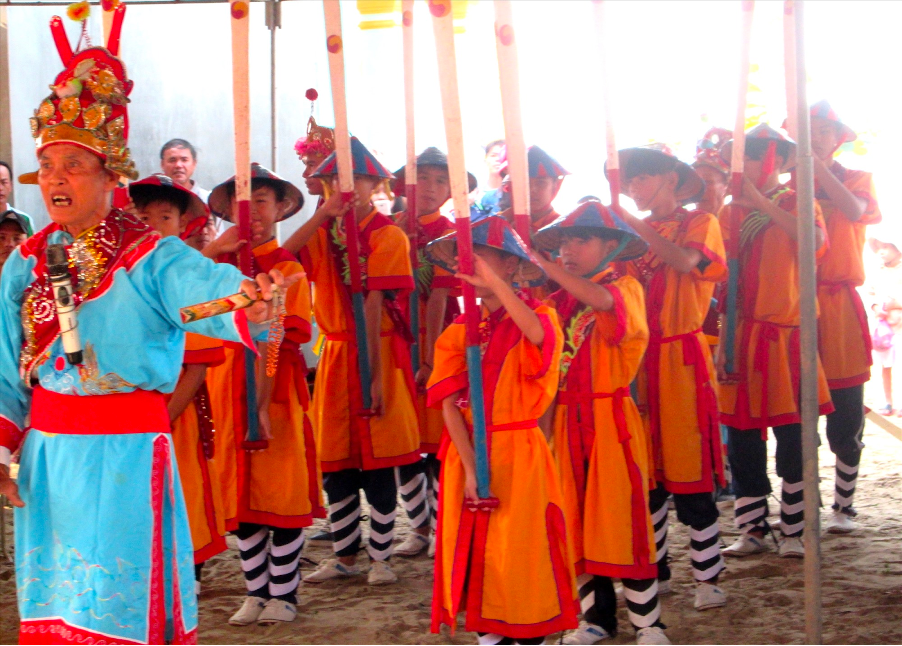
After the praying rite, the escort ritual begins with a big boat beautifully decorated with lanterns, flower garlands and flags slowly heading for the sea. The boat carries village elders and the music band and singing band and an altar with a tray of offerings. It is escorted by smaller boats of villagers. Sailing about four or five kilometers away from ashore, the big boat stops and the singing and music bands start their performances while the village elders burn votive papers, calling the spirit of Ca Ong to return to the village. After that, the boats sail back to the shore and the altar is carried back to the temple, a symbolic act of escorting Ca Ong to his home.
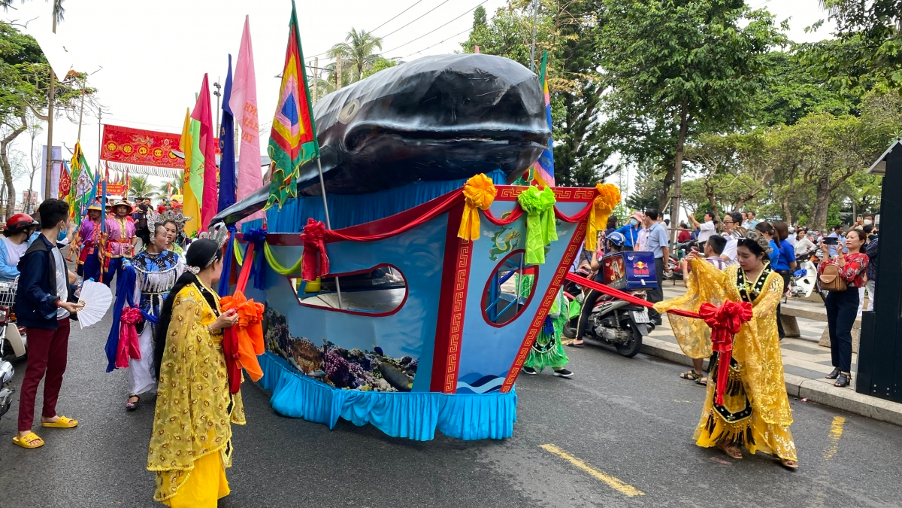
The Ca Ong escort ceremony is followed by the other two ceremonies dedicated to the gods and village founders in which the ritual conductor prays to the gods and deities and asks for their protection and support.
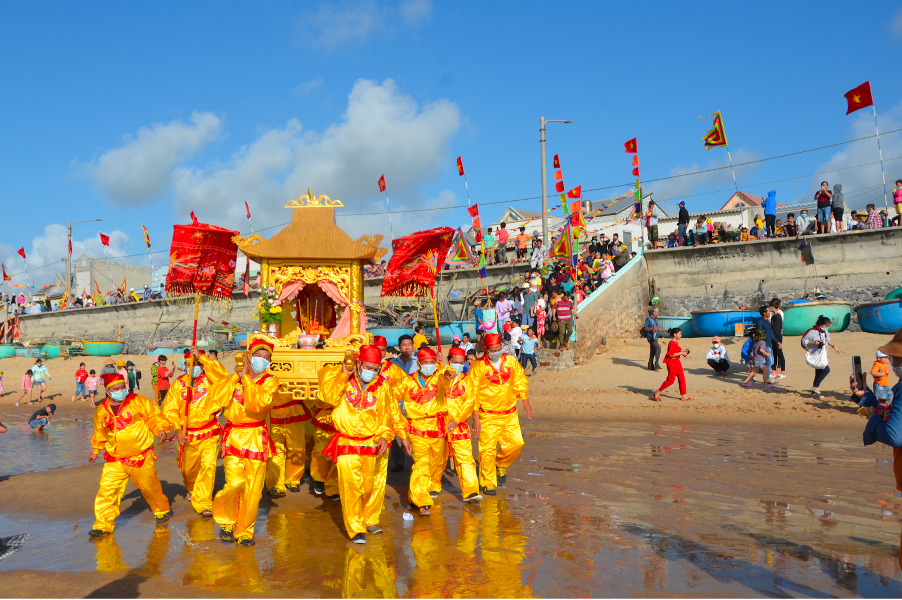
After the praying ceremonies are festive activities, including singing folk songs and playing folk games such as boat racing, swimming, duck chasing, crab catching, wrestling, tug of war and stilt walking.
We would be pleased to have you visit and take in our breathtaking scenery, unwind on our white sandy beaches, immerse yourself in our exquisite culture, and get to know the people of the friendliest nation. Especially, to savor our delicious food at restaurants with Michelin ratings or to come and participate in our incredible mega-events involving culture, music, sports, and tourism!
Make your plan to Vietnam right now by obtaining a Vietnam visa at https://www.vietnam-evisa.org. We, a reputable and reliable Visa service, will assist you turn your plan into reality at the very first step.
Source: vietnamlawmagazine.vn